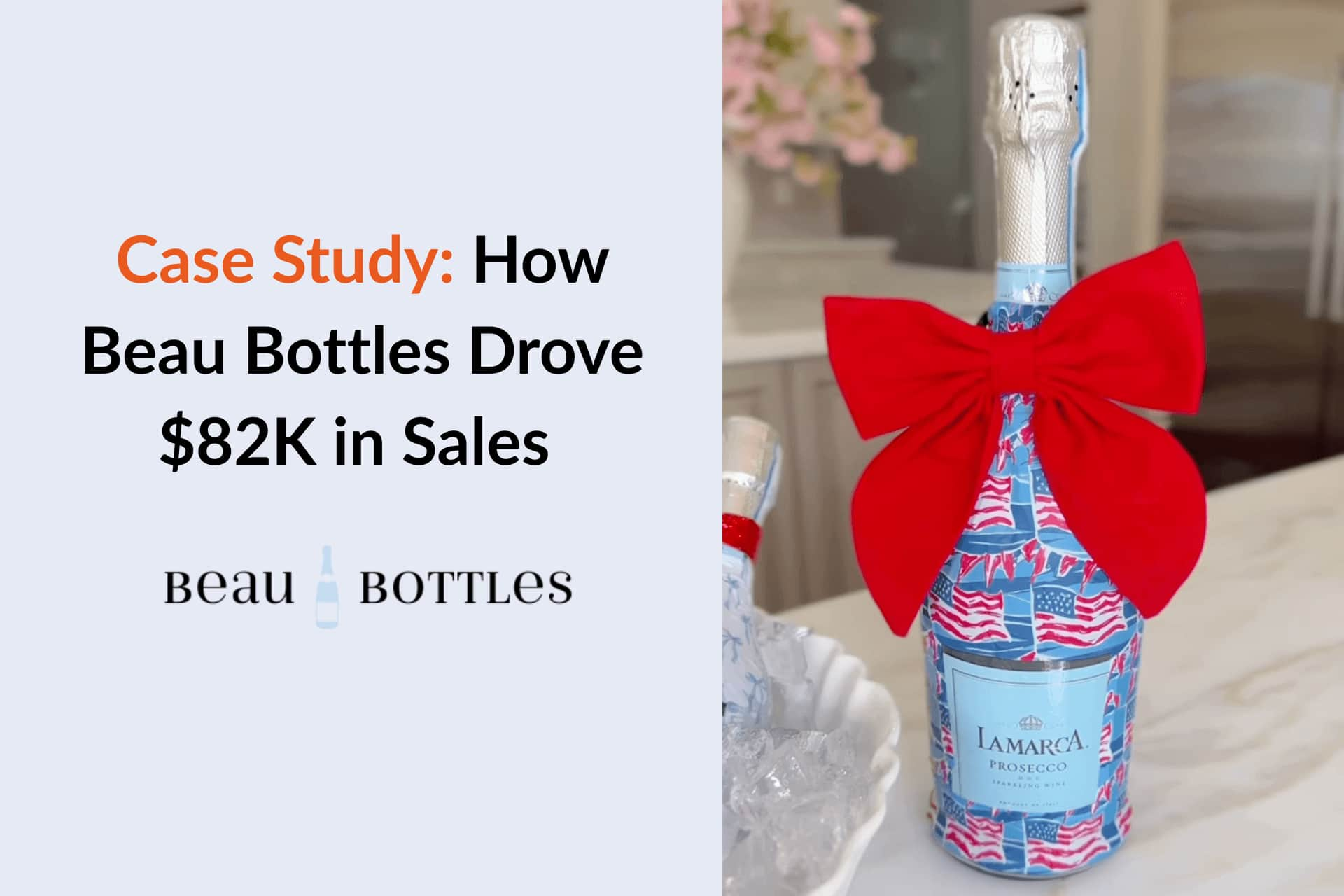





While MightyScout offers powerful influencer tracking and reporting, numerous users express frustration over its limited localization capabilities, sluggish notification delivery, and inflexible integrations. These recurring challenges motivate many businesses to seek more robust, agile influencer marketing solutions that better meet their regional targeting needs, deliver faster updates, and integrate more seamlessly with diverse ecommerce or ad systems.
According to recent sources, influencer marketing spend in the U.S. is projected to grow from $7.02 billion in 2023 to $9.29 billion by 2025, reflecting the increasing demand for comprehensive platforms that streamline creator collaborations alongside campaign performance tracking.
Below is the list of the Top 10 MightyScout alternatives we’ll explore in this article:
While MightyScout is highly regarded for its influencer tracking and reporting capabilities, there are several recurring limitations that make many businesses explore alternative platforms. Below are four key pain points frequently highlighted in reviews and user feedback.
MightyScout does not include native features for influencer outreach or campaign briefs. Brands and agencies must rely on external documents or third-party tools to communicate with creators and share campaign guidelines. This fragmented approach often slows down workflows and reduces efficiency during campaign execution.
The platform requires all influencer payments to be handled manually through services such as PayPal or Venmo. Although MightyScout allows users to log payments, there is no automation or built-in disbursement system. For teams managing multiple creators, this manual process increases administrative workload and creates unnecessary risk of missed or delayed payments.
MightyScout integrates only with Shopify and WooCommerce, restricting its use for businesses that rely on other e-commerce platforms. In addition, the platform does not offer ad-related integrations such as whitelisting or TikTok Spark Ads. As a result, marketers who want to extend influencer content into paid media campaigns must turn to additional tools, adding cost and complexity.
Although MightyScout excels at monitoring and reporting, its discovery and audience insight features are relatively limited. Users frequently mention the lack of advanced filters and demographic breakdowns, particularly for localization and niche targeting.
Our comparison focuses on several key aspects:

Best For: MightyScout is best for brands and agencies that need reliable, automated content capture (especially Stories), streamlined reporting, and ROI attribution for product seeding/affiliate campaigns—without long contracts. It’s a strong fit for Shopify/WooCommerce stores thanks to native integrations for coupon-based sales tracking.
Platform Coverage:
Pricing: Based on our research, all plans are month-to-month with a 14-day free trial; no annual contract required.
Reviews: 4.7 / 5.0 (G2)
Ease of Use (UX/UI): Users consistently describe MightyScout as intuitive and easy to navigate, with dashboards that consolidate campaign activity (posts, pending items, ROI) in one place. Reviewers say it “saves hours” by auto-tracking Stories and compiling shareable reports, though a few want more advanced filtering in reports.
Customer Support: Feedback emphasizes responsive, human support that resolves issues quickly; several reviewers call out fast replies and a willingness to incorporate feedback. This hands-on approach is a recurring theme across recent G2 and Capterra reviews.
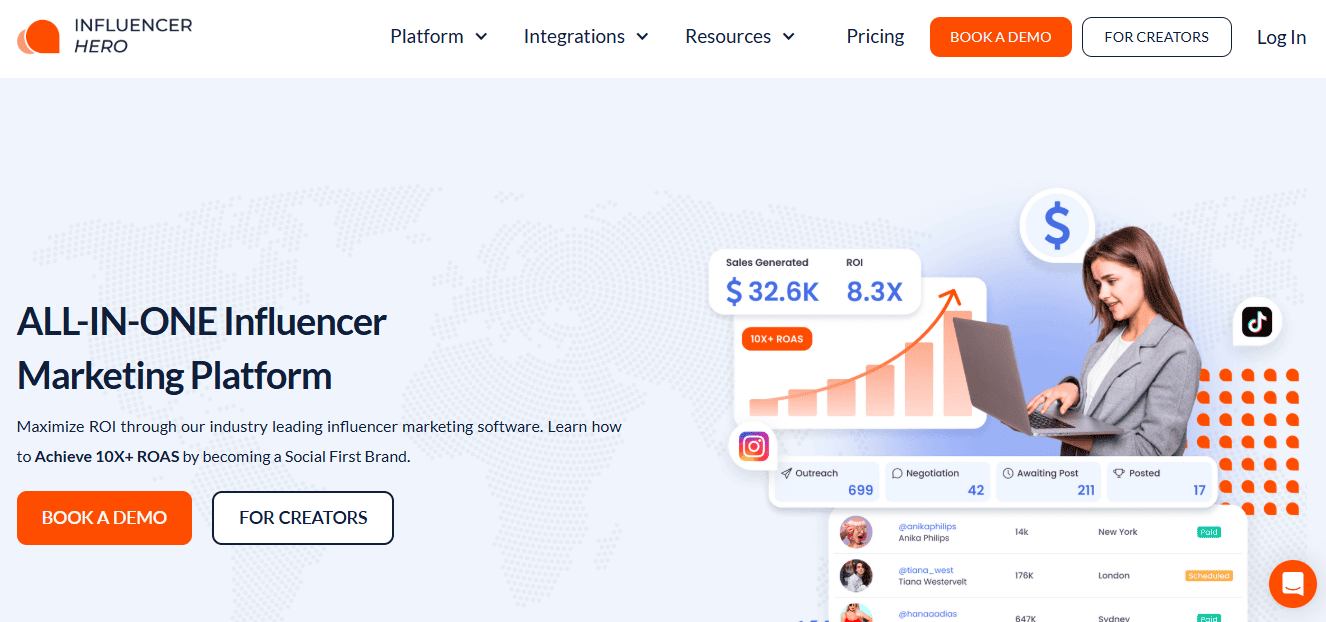
Best For: Influencer Hero is best for growing D2C brands and eCommerce teams on Shopify, WooCommerce, or custom platforms that want to scale influencer and affiliate campaigns with deep insights, automation, and ROI tracking. Its AI-powered CRM and multi-platform support make it ideal for companies managing large-scale influencer seeding and ambassador programs.
Platform Coverage:
Pricing: Influencer Hero offers flexible pricing plans to accommodate growing brands. All plans include core features and can scale as the influencer program grows.
Reviews: 5.0 / 5.0 (Capterra)
Ease of Use (UX/UI): Influencer Hero is widely praised for its intuitive design and user-friendly interface. The streamlined dashboard, drag-and-drop campaign setup, and automated workflows reduce manual effort, while customizable email templates and a Chrome extension save teams hours each week.
Customer Support: Customer support is one of Influencer Hero’s strongest attributes. Every plan includes a dedicated account manager from day one, with optional strategy consultations to help guide growth. The platform provides 24/7 real-human live chat, responsive email support, and an extensive Help Center with written and video tutorials. Pro plan users also receive access to a private Slack channel for continuous, priority support.
While MightyScout offers strong tracking and reporting at a lower entry price point (starting at $99/month), it falls short in areas like automated payments, advanced discovery, and multi-platform integrations. MightyScout is best suited for small teams looking for simple campaign monitoring, but its limited e-commerce support and manual workflows can hinder scale.
By contrast, Influencer Hero covers eight major platforms and includes robust features like AI-driven discovery, automated outreach, affiliate management, and payment automation—all in one system.
Although its entry pricing begins at $649/month, Influencer Hero is designed for brands seeking growth, scalability, and a complete end-to-end influencer marketing solution. This makes it a more future-proof choice for businesses looking to maximize ROI and streamline operations.

Best For: DTC and eCommerce teams (especially on Shopify) that need powerful creator discovery across Instagram, TikTok, and YouTube, plus streamlined outreach, tracking, and affiliate payouts in one flow. Multi-market brands that care about precise audience/location/language filters will get strong value.
Platform Coverage:
Pricing: There are different plans and options.
Reviews: 4.7/5 (G2)
Ease of Use (UX/UI): Teams highlight a smooth, end-to-end workflow—from discovery to gifting to affiliate payout—reducing tool-hopping and manual steps. Real-time dashboards and CRM-style status tracking (“Contacted,” “Negotiating,” “Confirmed,” etc.) make progress obvious at a glance. Gmail/Outlook syncing keeps outreach in one place.
Customer Support: Modash emphasizes guided onboarding and responsive support; many teams note setup feels straightforward thanks to clear workflows (discovery → campaign → payout) and practical help getting Shopify gifting/affiliate tracking live.
MightyScout starts lower ($99/mo Mini; month-to-month, 14-day trial) and shines in tracking/posts & Stories capture, social listening (tagged media without auth), and easy onboarding with strong support—great for teams prioritizing monitoring/reporting and simple CRM. However, its discovery depth and integrations are more limited, and outreach/payments are manual.
Modash focuses on discovery + outreach + affiliate operations: largest public creator database, advanced/AI discovery, Shopify-powered gifting and discount codes/UTMs, and automated affiliate payouts. Pricing is billed yearly (Essentials $199/mo; Performance $499/mo with caps like 800 profile views & 400 email unlocks/month), which suits committed programs on Shopify that want one streamlined path from shortlisting to payouts.
Choose MightyScout if you need affordable, month-to-month tracking/reporting and Story capture with light CRM and you’re okay handling outreach/payments elsewhere. Choose Modash if you’re Shopify-centric, need the strongest search + scalable outreach, and want built-in affiliate automation.

Best For: Upfluence is best suited for eCommerce brands—particularly Shopify and Amazon sellers—looking to scale influencer marketing through robust affiliate tracking and customer-influencer identification. It’s a comprehensive choice for brands seeking a full end-to-end platform to manage influencer discovery, outreach, campaign execution, and performance attribution.
Platform Coverage:
Pricing:
Reviews: 4.5/5 (G2)
Ease of Use (UX/UI): Upfluence offers a wide range of tools within a single dashboard, but many users note a learning curve, especially for beginners. While its interface is powerful, new users may need onboarding support to fully leverage the platform’s capabilities. Once familiar, users appreciate the centralized workflow and AI-assisted outreach for streamlining campaigns.
Customer Support: Upfluence provides responsive customer support through dedicated account managers, onboarding sessions, and ongoing assistance. Users often highlight the platform’s willingness to guide brands through setup and campaign strategy. The support team is available via email, onboarding calls, and offers help with integrations and custom campaign configurations.
MightyScout offers a more affordable, entry-level solution starting at $99/month, with flexible month-to-month pricing and a strong focus on content tracking, social listening, and campaign reporting. However, it lacks built-in outreach automation, advanced affiliate tracking, and robust eCommerce integrations.
By contrast, Upfluence is a more enterprise-grade platform with pricing starting at $1,276/month on an annual term. It includes deeper integrations with Shopify and Amazon, powerful affiliate tools, and AI-assisted outreach.
For brands that prioritize ROI tracking, affiliate management, and a unified end-to-end platform, Upfluence provides more robust capabilities. However, its higher cost and lack of contract flexibility may not be ideal for smaller teams or those testing influencer marketing for the first time.

Best For: Enterprise brands and agencies that need deep, multi-dimensional creator discovery (demographics, safety, sentiment), collaborative campaign workflows, and robust performance reporting with BI exports. Teams evaluating competitive activity and brand mentions across social at scale will find strong value.
Platform Coverage:
Pricing: There are different pricing options:
Reviews: 4.1/5 (G2)
Ease of Use (UX/UI): Users highlight time-savers like reusable “filter locking,” drag-and-drop metrics in reports, and public report links for quick stakeholder sharing—reducing back-and-forth. Campaign workspaces centralize internal comments, creator chats, and approvals so teams don’t have to jump between tools. Discovery is powerful and flexible, from bio keyword searches to competitor-collab views.
Customer Support: Feedback is mixed: while enterprise customers get structured onboarding, multiple public threads report slow or unresponsive support and unresolved payment/account issues. Experiences appear to vary by account tier and use case, so diligence on SLAs and payment flows is recommended.
MightyScout is budget-friendly and month-to-month (Mini $99/mo; Starter $249/mo; Growth $399/mo; Professional $749/mo), with a 14-day free trial—good for small teams or brands that want flexibility. Captiv8 requires an annual commitment of $25,000 plus a $3,000 onboarding fee; its optional Storefronts + Affiliate module is an added $20–30k per month—clearly enterprise territory.
MightyScout shines in tracking and reporting (including automatic post/Stories capture and social listening for tagged media without creator auth) and provides straightforward discovery/CRM with quick onboarding and strong support feedback for many users. Captiv8 leads on discovery depth (demographics, safety, sentiment), competitive intelligence, collaboration, and highly customizable analytics/BI exports—plus the ability to save complex filters and share public report links.
Which to choose? Pick MightyScout if you want an affordable, easy-to-launch tracker/reporter with light CRM and flexible monthly pricing. Choose Captiv8 if you’re an enterprise team needing rigorous discovery, compliance/safety vetting, collaborative workflows, and advanced reporting—and you’re comfortable with annual contracts and premium add-ons for commerce/affiliate.

Best For: CreatorIQ is best for mid-market to enterprise brands and agencies that need a full-lifecycle influencer stack—discovery, activation, briefs, approvals, payments, and advanced measurement—backed by direct API data and hands-on implementation support. Teams with compliance, scale, and multi-stakeholder workflows will feel at home.
Platform Coverage:
Pricing: There are different plans:
Reviews: 4.7/5 (G2)
Ease of Use (UX/UI): Users in enterprise environments value CreatorIQ’s structured workflows: configurable campaign templates, per-creator deliverable controls, and shareable “one-sheet” approvals keep decision-makers aligned. Live, no-login reporting links reduce back-and-forth and make executive readouts simple.
Customer Support: CreatorIQ pairs the software with people: dedicated implementation managers and customer success teams provide onboarding, quarterly planning, and strategic guidance. Close relationships with Meta/TikTok/YouTube translate into trustworthy data and early access to new formats.
MightyScout starts at $99/mo with month-to-month plans and a 14-day free trial, making it easy to pilot and scale gradually. CreatorIQ is sold on annual contracts, with most buyers landing around $2k–$5k/month for core packages; Creator Connect is a paid add-on (~$15k/yr), and creator payouts are free up to $100k/year then 2%.
When to choose MightyScout: Pick MightyScout if you’re a lean brand/agency that wants fast onboarding, automated content capture (including Stories), straightforward reporting, and Shopify/WooCommerce attribution—without long commitments. It’s a strong value for small to midsize programs that don’t need built-in outreach or payments.
When to choose CreatorIQ: Choose CreatorIQ if you need end-to-end lifecycle coverage with robust discovery, briefs/approvals, built-in payouts & tax compliance, and customizable analytics backed by direct API data. It’s better suited for teams with complex workflows, strict compliance, and executive reporting needs.

Best For: Data-driven brands and agencies that need rigorous creator vetting (authenticity, audience quality, brand safety) across many networks—Instagram, TikTok, YouTube, Twitch, X, and Snapchat—and want eCommerce ROI tracking tied to promo codes/links. Customizable plans suit teams that prefer a reports-based model with onboarding.
Platform Coverage:
Pricing: HypeAuditor’s pricing is customizable, with the standard “Business” plan starting at around $10,000/year. Pricing can be adjusted based on the number of reports, active campaigns, and platform usage. They also offer a 24–48 hour free trial for new users.
Reviews: 4.6/5 (G2)
Ease of Use (UX/UI): Teams like that discovery, outreach, contracts, and content approvals live in one flow (lists, bulk messages, templates, draft approvals, e-signature). That said, several users flag a learning curve—training/onboarding helps unlock its depth.
Customer Support: Business plans include onboarding and support, which helps teams adopt workflows like campaign tracking and eCommerce attribution. Given the platform’s breadth, many customers lean on that onboarding to speed time-to-value.
MightyScout is month-to-month with a 14-day free trial and tiers starting at $99/month (Mini, Starter, Growth, Professional). HypeAuditor’s standard Business plan is ~$10,000/year with report allocations; it offers a 24–48h free trial and includes onboarding/support. If you favor flexible, low-commit pricing, MightyScout wins; if you want enterprise-style packaging with training and broader network coverage, HypeAuditor fits.
MightyScout excels at automated post/Stories capture, social listening for tagged media without creator auth, and quick setup with strong support sentiment—great for tracking/reporting with simple CRM. HypeAuditor leans into deep discovery (AI, lookalikes, safety/quality), integrated outreach with contracts/approvals, and eCommerce ROI reporting (clicks, orders, revenue, conversion).
Which to choose? Pick MightyScout if you want affordable, fast-to-launch tracking/reporting with month-to-month flexibility and you’re fine handling payments/licensing elsewhere. Choose HypeAuditor if you need broad network coverage, rigorous authenticity/safety scoring, built-in contracting, and eCommerce ROI—with budget for an annual plan.

Best For: GRIN is best for DTC and eCommerce brands that want a true end-to-end stack—discovery, outreach, gifting, UGC, affiliate tracking, and creator payments—tightly integrated with storefronts and finance tools. It’s a strong fit for teams running product seeding at scale and commission-based programs who value built-in payouts and ROI attribution.
Platform Coverage:
Pricing:
Reviews: 4.5 / 5.0 (G2)
Ease of Use (UX/UI): Users like that GRIN centralizes daily work—creator email from your own domain, product gifting via Shopify, and a searchable UGC library—so they spend less time tab-hopping. The browser extension and landing pages also help keep the pipeline full without spreadsheets. That said, some reviewers report slow loads, glitches, or duplicate/buggy content uploads, which can interrupt otherwise smooth workflows.
Customer Support: Brands highlight that GRIN can feel “hands-on” when you use optional program strategists and the built-in payment/contract rails. Others note uneven follow-through at times (e.g., delayed responses or unresolved tickets), so support quality can vary by team and use case.
MightyScout is month-to-month, starting at $99/mo with a 14-day free trial, making it easy to pilot without risk. GRIN generally requires annual contracts and sits in a higher pricing band—documentation mentions a $25k/year option and a $2.5k–$10k+/mo range depending on features and scale.
When to choose MightyScout: Choose MightyScout if you want fast onboarding, automated content capture (including Stories), simple reporting, and Shopify/WooCommerce attribution at a much lower entry price. It’s ideal for lean teams or agencies that don’t need built-in payouts or heavyweight outreach—plus you can cancel any time.
When to choose GRIN: Choose GRIN if you need a deep, store-native workflow with creator emails from your domain, inbound application pages, contract/rights handling, PayPal payouts, and affiliate/ROI analytics in one place. You’ll pay more and commit annually, but in exchange you consolidate tools and unlock high-scale eCommerce processes.
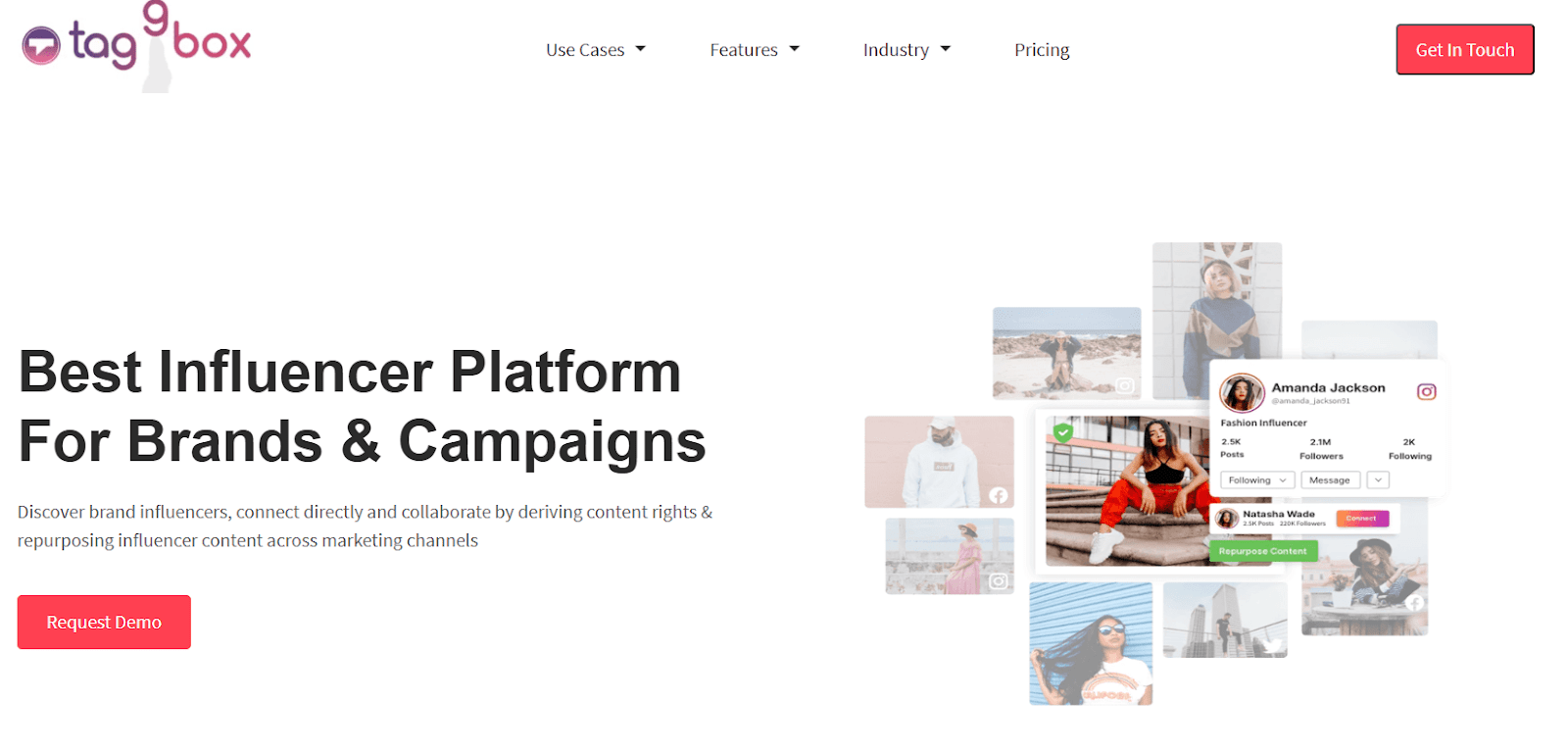
Best For: Brands, agencies, and organizations that want a centralized hub to collect, manage, and repurpose UGC—then publish it across websites, product pages, digital signage, and more. Also useful for teams that want to discover and connect with creators for social proof/social commerce without committing to a heavyweight influencer CRM.
Platform Coverage:
Pricing: Taggbox offers four main subscription plans, each with higher feed limits, faster content updates, and expanded moderation tools.
Reviews: 4.8 / 5.0 (G2)
Ease of Use (UX/UI): Setup is straightforward for building multi-network feeds, moderating content, embedding widgets, and tracking performance. That said, the backend can feel unintuitive at first and certain settings take multiple clicks to find—so new users may face a short learning curve.
Customer Support: Users praise responsive support on paid plans (chat/call available on higher tiers), along with helpful docs and tutorials for onboarding. Free-plan users may find support more limited, and occasional feed/update delays can require coordination with support during time-sensitive moments.
MightyScout is a month-to-month influencer platform with a 14-day free trial and tiers from $99 to $749/month; it emphasizes influencer tracking, automated post/Stories capture (even before they expire), social listening of tagged media without creator auth, and straightforward CRM/reporting. Taggbox offers a Free plan plus paid tiers at $19, $29, and $79/month focused on UGC aggregation, rights, moderation, and omnichannel embeds/shoppable UGC—more of a UGC engine than a full influencer CRM.
Choose MightyScout if your priority is measuring creator activity and campaign results—tracking all posts/Stories, pulling tagged content without authentication, and exporting clean campaign reports—while keeping flexible, no-contract pricing. Choose Taggbox if you need to collect social proof at scale, secure usage rights, and publish shoppable UGC across web/product pages and screens, with AI moderation and multi-network feeds.
If you’re running influencer programs and want deep tracking/reporting with a lightweight CRM, MightyScout is the safer fit. If your main goal is to operationalize UGC (curate, obtain rights, and commercialize it via embeds and social commerce), Taggbox delivers stronger value at lower entry pricing.
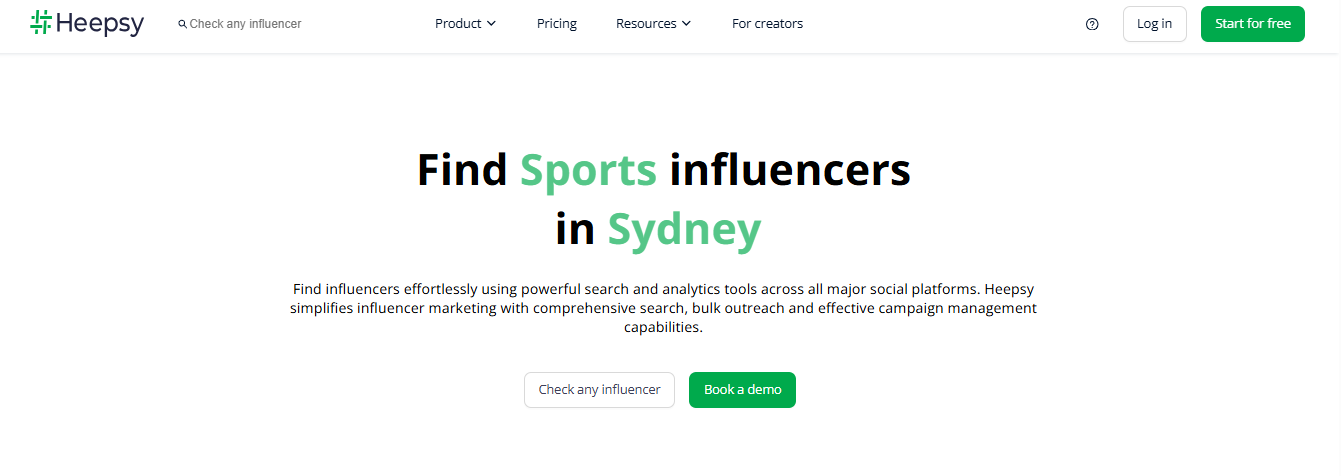
Best For: Heepsy is best for brands and agencies that need high-volume influencer discovery plus built-in bulk outreach and a simple CRM pipeline to move creators from prospecting to activation. It’s especially useful for eCommerce teams that want Shopify-based affiliate/sales tracking—available on the Advanced plan.
Platform coverage:
Pricing & Commitment: There are different plans:
Reviews: 4.5 / 5 (G2)
Ease of Use (UX/UI): Users call out Heepsy’s multi-filter search (keywords, follower tier, engagement, audience location/age/gender) as quick to learn and precise. The Kanban-style pipeline makes it easy to track “emailed → approved → shipped → sales → paid,” and bulk add/export keeps workflows tidy. Media galleries and one-click PDF exports simplify reporting handoffs.
Customer Support: Heepsy provides onboarding calls and helpful customer support, including extra outreach templates beyond what ships in-product. Plans are flexible (monthly, 6-month, or annual) with occasional seasonal discounts; teams can upgrade/downgrade/cancel as needed.
MightyScout is month-to-month starting at $99/mo with a 14-day trial, making it low-risk to pilot. Heepsy offers monthly, 6-month, and annual options; the Advanced plan lists at $369/mo with occasional seasonal discounts (e.g., 35% off annual; 20% off 6-month). Heepsy’s Plus plan is the lighter/cheaper tier (engagement-level reporting; no sales data).
Choose MightyScout if you prioritize automated content capture (including Stories before they expire), straightforward reporting, and fast onboarding—with the caveat that outreach and payments are handled outside the platform. Choose Heepsy if you want built-in prospecting + bulk outreach and a visual CRM to push many creators through sequences, especially when pairing the Advanced plan for Shopify sales attribution.
MightyScout’s value is hard to beat at entry price, but it’s lighter on in-platform outreach and commerce operations. Heepsy covers search, outreach, and CRM in one place, yet sales/revenue tracking is locked to Advanced and outreach lacks AI generation—so teams balancing cost vs. capability should map needs to tier carefully.
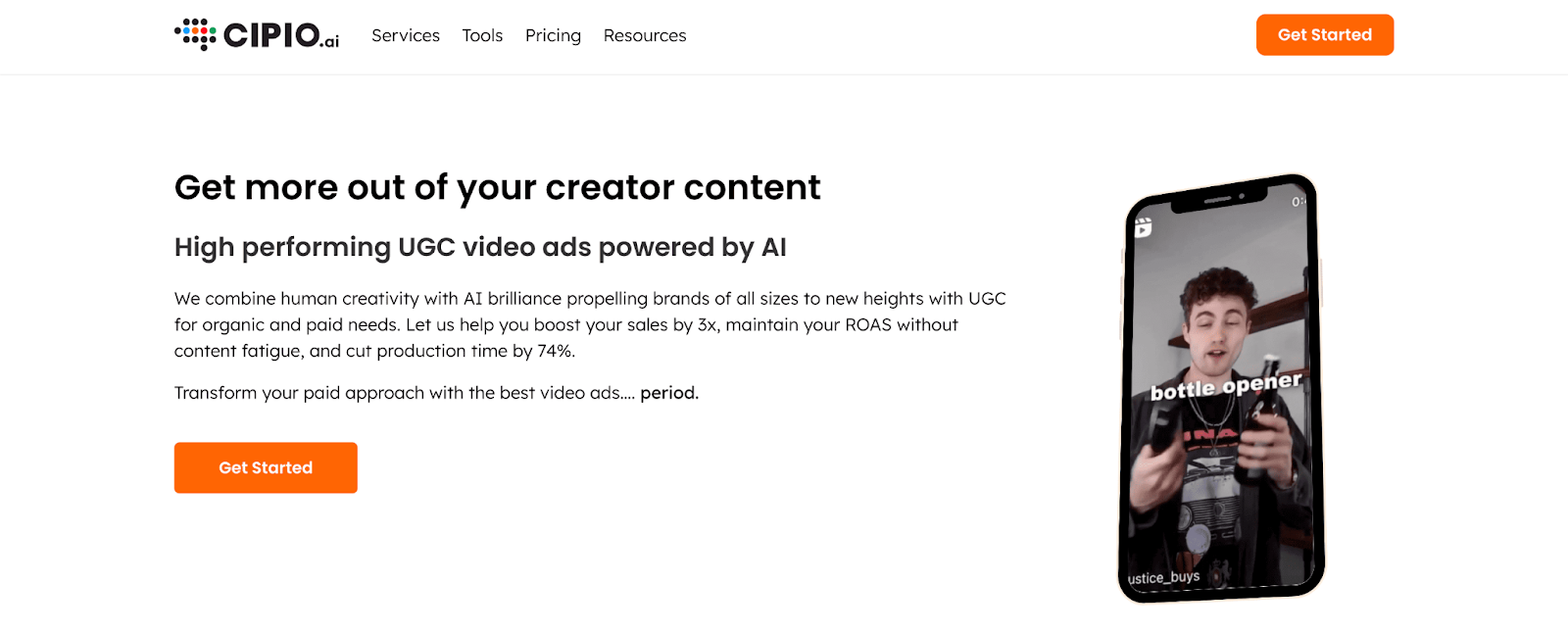
Best For: eCommerce brands on Shopify or Amazon that want to scale influencer gifting and turn UGC into paid ads—without managing creator comms and logistics in-house (managed-service heavy). Also fits teams prioritizing ROAS-oriented creative production over full self-serve CRM.
Platform Coverage:
Pricing: Cipio offers three flexible pricing models.
Pay-As-You-Go:
(No contract required; billed monthly based on usage.)
Quarterly Plan (min. 15 creators & 18 ads):
Annual Plan (min. 60 creators & 72 ads):
Reviews: 4.9 / 5.0 (Glassdoor)
Ease of Use (UX/UI): Users describe the interface as clean, but advanced customization is limited, and there’s no robust self-serve dashboard for outreach or analytics—so hands-on marketers may feel constrained. The streamlined, managed workflow appeals to lean teams that prefer Cipio to handle creator operations.
Customer Support: Account managers are reported as responsive and proactive in sourcing creators and resolving issues, which helps offset the lighter self-serve controls. Some users want more visibility into creator interactions instead of relying entirely on Cipio’s internal team.
MightyScout uses flexible, month-to-month SaaS tiers with a 14-day free trial (Mini $99/mo; Starter $249/mo; Growth $399/mo; Professional $749/mo). Cipio is priced per creator/ad (e.g., $149 per creator; $459 per ad creative) with discounted quarterly/annual bundles—costs scale with campaign volume rather than seats or features.
MightyScout excels at automated tracking (captures posts and Stories—even before they expire) and social listening for tagged media without creator authentication, with straightforward discovery, CRM, and reporting. Cipio focuses on a managed UGC-to-ads pipeline: aesthetic-based creator sourcing, gifting-first production, and turning content into paid-ad variants, but offers lighter self-serve discovery/analytics.
Which to choose? Pick MightyScout if you want an affordable, self-serve platform for tracking/reporting with light CRM and you value flexible monthly pricing. Choose Cipio if your priority is outsourced creator operations and ROAS-oriented UGC production, and you’re comfortable with per-creator/ad pricing and less in-platform control.
If you like MightyScout’s fast setup and auto-tracking (especially Stories) but need more built-in outreach, eCommerce ops, or enterprise controls, the alternatives give you clear paths: Influencer Hero for an all-in-one workflow with search, outreach, and analytics; GRIN for store-native gifting, affiliate tracking, and payouts; Heepsy for high-volume discovery + bulk email; and CreatorIQ for enterprise governance, approvals, and advanced measurement.
Want a fast win? Influencer Hero is one of the best MightyScout alternatives if you’re aiming to streamline prospecting, outreach, and performance tracking without juggling multiple tools. Book a demo with Influencer Hero to see how it can boost your brand’s influencer pipeline, speed up reporting, and turn more creator collaborations into revenue.

Top picks include Influencer Hero, GRIN, CreatorIQ, Heepsy, Modash, and Upfluence. Influencer Hero stands out for an all-in-one workflow (discovery, outreach, analytics). GRIN excels at eCommerce gifting, affiliate tracking, and payouts. CreatorIQ suits enterprises that need governance, approvals, and advanced measurement. Heepsy is great for high-volume discovery + bulk email. Modash and Upfluence add strong databases with campaign tools.
If you need native outreach + CRM, look at Influencer Hero, GRIN, Heepsy, and Upfluence. They let you email creators, manage pipelines, and track replies in one place. (MightyScout focuses more on automated content capture/reporting; most teams pair it with a separate outreach tool.)
MightyScout is known for accessible, month-to-month tiers and a free trial. Heepsy offers monthly and annual options (with deeper tracking on higher tiers). Influencer Hero provides bundled plans that replace multiple tools (discovery + outreach + analytics), often lowering total stack cost. GRIN and CreatorIQ typically price at the higher, enterprise end with annual contracts. Always map must-have features (outreach, payments, affiliate tracking, reporting depth) to the tier—not just the brand.
For store-native workflows, consider Influencer Hero (end-to-end creator management with affiliate links/codes and performance tracking) and GRIN (deep Shopify + payouts). Heepsy adds Shopify-based tracking on advanced plans. CreatorIQ brings governance and reporting with links/codes in enterprise setups. MightyScout can attribute via codes and makes reporting/shareable dashboards fast, but most brands layer it with separate outreach/payments.
Start with a quick checklist:



Schedule a Demo with one of our media experts below.